This article is adapted from Fortune: How Race Broke My Family and the World—And How to Repair It All (Brazos Press, a division of Baker's Publishing Group, Feb. 2022, used by permission).
ONE MONTH AFTER thousands of white nationalist men and women stormed the U.S. Capitol while attempting a coup d’état under Trump flags—resulting in the deaths of five people and assaults on 140 police officers—former President Trump’s second impeachment trial began. In the opening arguments, House impeachment managers rolled the tape, illuminating the truth of the horrors of Jan. 6, 2021.
The evidence presented for impeaching Trump was overwhelming, though many leading GOP members turned their eyes, busied themselves, and refused to reckon with reality. House Democrats voted unanimously for impeachment, and 10 Republicans joined them, making it the most bipartisan vote of its kind in U.S. history. While 57 senators found Trump guilty of “incitement of insurrection,” Trump was acquitted—even though the majority of senators found him guilty of leading a coup against the United States.
That vote revealed a fundamental malformation in our national governance. It is not new. It has been with us from the beginning—from the days when my ninth-great-grandmother, Fortune, was sentenced to indentured service, even though the Maryland race law that she was born under had been successfully challenged. The law changed after she was born, yet a judge—an arbiter of what is supposed to be true and just in our nation—bent the truth of the law to sentence her to generations of powerlessness, exploitation, and rape that she (and we) should not have had to endure.
Read the Full Article

